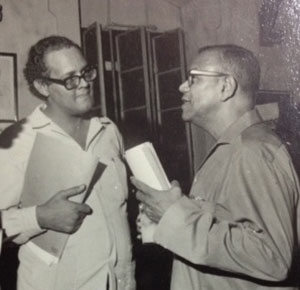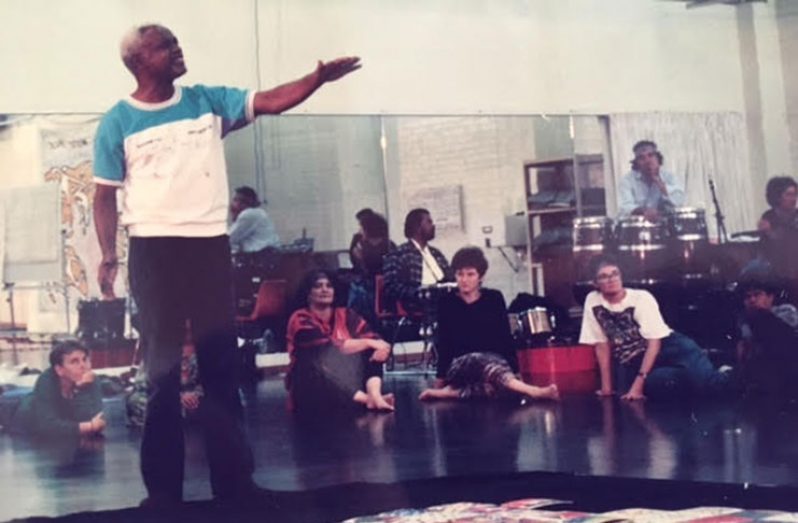By Francis Quamina Farrier
“This I have learnt, today a speck
Tomorrow a Hero, Hero or Monster
You are Involved.
Like a Jig shakes the loom
Like a web is spun the pattern
All are involved, all are consumed.”
I HAVE started many of my solo and other Poetry Performances and Readings with that very short Martin Carter poem. As such, I invite you to be totally involved with the essence of this feature article, as we approach “World Poetry Day” 2018, which will be celebrated on Wednesday, March 21, no doubt with Poetry Sessions all across the country.

As part of its objective for World Poetry Day, The United Nations Educational, Scientific and Cultural Organisation (UNESCO), published the following statement; “The Observance of World Poetry Day is meant to encourage a return to the oral tradition of poetry recitals, to promote the teaching of poetry, to restore a dialogue between poetry and the other Arts such as Theatre, Dance, Music and Painting and to support small publishers and create an attractive image of poetry in the media, so that the art of poetry will no longer be considered an outdated form of Art, but one which enables society as a whole to regain and assert its identity.”
That UNDP object has by-and-large, been observed in Guyana over the years, with both younger and older Guyanese, writing and performing poetry in many locations; in theatres, schools, libraries, churches and also at funerals and other events. There are occasions when Poetry is also done outdoors, such as the occasion two years ago when I did a Poetry and Storytelling Performance one afternoon under the Big Tree at Mocha Village on the East Bank Demerara.
It was a pleasant surprise when The National Library, under my production, staged a Poetry Show entitled, “See More Poetry” at the Theatre Guild Playhouse in Georgetown in observance of the Centenary of the birth of National poet, AJ Seymour. Poetry lovers turned out in large numbers and the theatre was packed to over-flowing.
It is impossible for me to name all of the notable poets of Guyana in this article, however, here is a very small sample; Martin Carter, AJ Seymour, Rajkumari Singh, Wordsworth McAndrew, Bobby Fernandes, Sheik Sadeek, Mahadia Das, Ivan Forrester, John Agard, Grace Nichols, Ian McDonald, Ras Michael Juene, Basil Rodrigues , Stephanie Bowery, Capt. Lloyd Marshall, Dmitri Allicock, Donald Trotman and Egbert “Leo” Martin (the latter writing during the 1890s).
My interest and love of poetry go all the way back to my early schooling at the St Ann’s Anglican at Agricola. From foreign works for children such as, “Mary had a little Lamb” and “Tom, Tom the Piper’s Son”, to the grand works of Guyana’s own Martin Carter and AJ Seymour, and the Caribbean’s Nobel Prize winner for Literature, Derrick Walcott.
But let us retract that English poem (Nursery Rhyme if you prefer), about Tom the piper’s son. It tells the story of a little boy who stole a pig and ran away with it. For the love of all that’s good, who would want to write a poem about a little fellow who stole a pig? Well, an English gent did! Having taken that (naughty) swing at the English, I have to admit that some of the greatest poets have been English; Blake, Chaucer, Eliot, Keats, Kipling, Milton, Shakespeare, Shelley and others.
Now let me juxtapose Oscar Wilde, an Irish Poet and playwright, with Guyana’s Martin Carter. Both men were brilliant writers and very popular in their time. Both writers spent time in prison; Martin Carter as a political prisoner of the British; Oscar Wilde imprisoned by the British on conviction of homosexuality. While Martin Carter lived a relatively comfortable life and on his death was buried at the prestigious Seven Ponds in Guyana’s Botanical Gardens, Oscar Wilde in his later years lived in poverty in France and was buried in a pauper’s grave in Paris.
Both Carter and Wilde wrote poems about the taking of human life. Martin Carter wrote, “Men Murder men, as men must murder men.” Oscar Wild wrote, “And all men kill the thing they love.” I once asked Carter why he wrote so much about death. His answer was, “From the time we are born, death is hovering to snatch us.”
In a previous paragraph mention was made of UNESCO’s promotion of the “Oral Tradition” of poetry, which leads me to one of my own poems which is entitled “Let Me Speak”. In that poem, I implore others to listen to my voice, as Martin Carter wrote, “No, I will not still my voice”, which is the first line of one of my favourite Martin Carter poems, “Looking at your Hands”, a poem which I just love to perform.
One of the most performed Guyanese poems is “Ole Higue” by poet and folklorist Wordsworth McAndrew. It has been done in a myriad of ways, including dance. I myself have done it in Guyana and around the Caribbean, as well as in the USA and Canada, England and Australia.
In more recent years, this very popular poem has become somewhat controversial since an old woman who villagers concluded was an Ole Higue, was beaten to death in an East Coast Demerara village a few years ago. That was the same fate of the fictional Ole Higue in that McAndrew poem as death blows are mercilessly rained down on the unfortunate “Old woman wid de wrinkled skin”;
“Waxen, waxen, pladai, plai
Die yoh witch yoh, die”.
While mention was made of poets from Europe, I need to mention just two from the USA, who are my favourites; James Weldon Johnson and Maya Angelou. From Asia, Rabindranauth Tagore of India, and from Africa, President Leopold Senghor of Senegal.
There have been many poems about death; Martin Carter’s “Death Must not Find us thinking that we Die” is one said many times, especially at funerals. On the issue of death; suicide, in particular, I wrote a poem entitled “Makonaima’s Sacrifice” which was inspired by the three suicides which were committed at the Kaieteur Falls. It was a challenge for me writing that poem because while I did not want to justify or glorify suicide, at the very same time I was very careful not to make my work one in which I seem to sit in judgement over the victims.
So what is going to happen on World Poetry Day 2018 here in Guyana? My hope is that Poetry sessions would be held everywhere; in homes, schools, libraries, churches, hospitals, offices, police stations, beer gardens, prisons, rum shops, in the markets, senior citizens homes, hotel lobbies and orphanages as well as the open-air under the blue sky or big green trees; and certainly in the media – just about everywhere. After all, it’s World Poetry Day.
In closing, I extend condolences to the relatives and friends of the great Guyanese novelist and poet, Sir Wilson Harris, who recently passed away on March 8, 2018, at age 96. May his poetry live on in our schools, libraries, stages, radio and television, as well as in our magazines and especially in our hearts.


.jpg)











